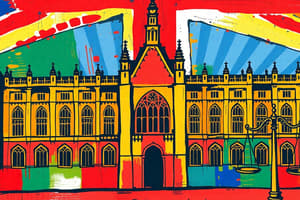Podcast
Questions and Answers
Which of the following countries shares a parliament with England and Wales?
Which of the following countries shares a parliament with England and Wales?
- Scotland
- Northern Ireland
- Zimbabwe
- All of the above (correct)
The UK has a written constitution that serves as the supreme law of the land.
The UK has a written constitution that serves as the supreme law of the land.
False (B)
What is the primary legislative body in the UK Parliament?
What is the primary legislative body in the UK Parliament?
House of Commons
The House of Lords is the __________ house of the UK Parliament.
The House of Lords is the __________ house of the UK Parliament.
Match the following components of the UK Parliament with their descriptions:
Match the following components of the UK Parliament with their descriptions:
What is the term used to describe the principle that the UK Parliament can create any law it chooses?
What is the term used to describe the principle that the UK Parliament can create any law it chooses?
The House of Commons is considered the upper house of the UK Parliament.
The House of Commons is considered the upper house of the UK Parliament.
What is the name of Wales's devolved legislature?
What is the name of Wales's devolved legislature?
In Zimbabwe, all laws must conform to its __________.
In Zimbabwe, all laws must conform to its __________.
Match the components of the UK Parliament with their roles:
Match the components of the UK Parliament with their roles:
Flashcards
Parliamentary Sovereignty
Parliamentary Sovereignty
The principle that the UK Parliament, specifically the House of Commons, has the ultimate power to make laws and cannot be overruled.
House of Commons
House of Commons
The lower house of the UK Parliament, composed of elected Members of Parliament (MPs), representing specific geographic constituencies.
House of Lords
House of Lords
The upper house of the UK Parliament, composed of peers. It primarily acts as a revising and scrutinizing chamber for bills passed by the House of Commons.
Bicameral Parliament
Bicameral Parliament
Signup and view all the flashcards
Monarch's Role in Lawmaking
Monarch's Role in Lawmaking
Signup and view all the flashcards
Constitutional Supremacy
Constitutional Supremacy
Signup and view all the flashcards
Bill Process
Bill Process
Signup and view all the flashcards
Royal Assent
Royal Assent
Signup and view all the flashcards
Bicameral Legislature
Bicameral Legislature
Signup and view all the flashcards
Study Notes
Parliamentary Law Making
- England and Wales are two of the four countries in the UK, along with Scotland and Northern Ireland.
- England and Wales share a UK parliament in London, responsible for laws affecting the entire UK.
- Wales has a devolved legislature (Senedd) with powers over specific areas like health, education, and agriculture, impacting only Wales.
- England and Wales share a legal system, with similar laws and courts (e.g., Crown Court, Court of Appeal).
- Zimbabwe has a written constitution, which acts as the supreme law of the land. All laws must comply with it.
- The UK has no written constitution; its parliament holds ultimate law-making authority.
- The UK parliament is a bicameral legislature (two houses), a continuous representative assembly, and one of the oldest in the world.
House of Commons
- The House of Commons is the lower house of the UK parliament, historically more powerful than the House of Lords, despite being a lower house
- MPs represent geographical constituencies; the person who gains the most votes is elected.
- Elections occur every five years but can be called earlier.
- MPs can also be elected through by-elections if an MP dies or retires.
- The House of Commons is the UK's primary legislative body; most legislation starts there.
- Bills are debated and amended in various stages, then sent to the House of Lords.
- The House of Commons is the primary legislative body in the UK and where most bills are introduced.
- Bills, after scrutiny and debate, are sent to the House of Lords.
Studying That Suits You
Use AI to generate personalized quizzes and flashcards to suit your learning preferences.




